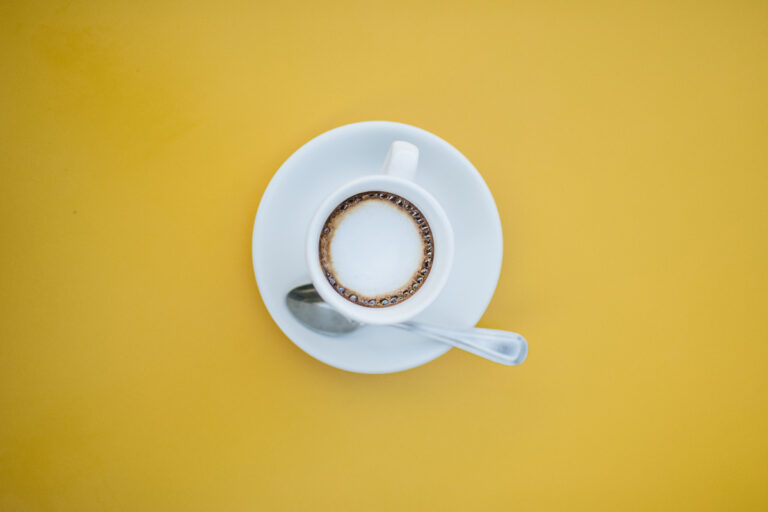Wake up and smell the lab-grown coffee of the future

The conversation around the climate crisis has deepened in recent years—I mean hello, it’s about time—with due pressure being placed on governments and officials around the world to take imminent Earth-saving action. Such pressure is often fronted by the likes of the ever vocal Greta Thunberg and our national treasure, David Attenborough. Among these demands and loud headlines, new innovations have continuously surfaced from individuals, groups and scientists across the globe to better combat such time-sensitive issues—here’s six oddly unique invention examples we found. Trust me, there’s some weird ones.
Some of the more common solutions put forward however, are: billionaire-backed fake meats, adopting a vegan diet altogether, using AI (obviously), sustainable fashion solutions and heck, even LEGO is trying to help with its greener plastic bricks—no, not the colour, the material. Basically, people are trying to invent anything and everything before the impending apocalypse hits. The latest? Coffee. Let me explain.
Are you a coffee addict? Or even, dare I say, a pretentious coffee connoisseur? If so, you’re probably obsessed with everything remotely made of coffee beans. Well, now there seems to be a new coffee on the horizon and no, it’s not a roast—whatever the heck that means, I’m more of a tea drinker myself. We’re talking about lab-grown coffee here. Some scientists are claiming that they have been able to successfully develop a coffee, from cell cultures, that simulates the same aroma and taste of the real deal.
This latest lab-grown climate change innovation comes from the VTT Technical Research Centre of Finland—a state-owned and controlled non-profit company—where a sustainable alternative to traditionally grown coffee beans has been uncovered. The process to create such beans takes place in a bioreactor where nutrient medium are used alongside cell cultures to create varying plant-based products.
Doctor and research team leader Heiko Rischer from VTT stated as part of the company’s press release, that “this project has been part of our overall endeavour to develop the biotechnological production of daily and familiar commodities that are conventionally produced by agriculture. For this we use many different hosts, such as microbes, but also plant cells.”
The technique first begins with the sterilisation of a coffee plant leaf—this is done to eliminate traces of any unwanted contaminants. It is then placed on a bed of nutrients that aid the stimulation of cell growth. It is when these steps have been completed that the cells formed are transported to the bioreactor. Once they make their way into the bioreactor, the cell culture is in the best environment to grow even further. Upon each substantial and sizeable growth, it is then moved to consecutively larger bioreactors respective to its mass. The entire method from inception to harvestation totals around two weeks.
VTT’s breakthrough process to make coffee, as mentioned by Rischer, is part of the development of better production methods for traditional agriculture. In this case, the non-profit’s approach does not involve the use of pesticides and, in fact, produces a much lower water and carbon footprint in comparison to the coffee industry’s devastating climate consequences—the company is currently conducting a life cycle analysis of the lab-grown coffee process. “Once we have those figures, we will be able to show that the environmental impact will be much lower than what we have with conventional cultivation,” Rischer told The Guardian. So, it ticks all the boxes for climate conscious consumers thus far, but does it do the same for coffee connoisseurs? What about the taste?
Well, once the final biomass was formed, VTT studied it as part of a recreation of the roasting process, with the resulting product evaluated by a panel of trained sensory individuals. “To describe it is difficult but, for me, it was in between a coffee and a black tea,” Rischer explained to The Guardian. “It depends really on the roasting grade, and this was a bit of a lighter roast, so it had a bit more of a tea-like sensation,” he continued. Wait, coffeeholics! Don’t click away just yet, there’s more.
“In terms of smell and taste, our trained sensory panel and analytical examination found the profile of the brew to bear similarity to ordinary coffee,” Rischer stated, “However, coffee making is an art and involves iterative optimisation under the supervision of specialists with dedicated equipment. Our work marks the basis for such work.” So when can you get your hands on VTT’s bean brew? Sorry to disappoint, but it might take a while.
While taste testing the coffee, Rischer couldn’t actually swallow it as it has not yet been authorised for public consumption—instead, the drink was swirled around the mouth and spat out. The Guardian noted Rischer’s predictions that approval in both Europe and the US could be sought in around four years’ time and could end up revolutionising the coffee industry altogether. However, it might face some stiff competition along the way.
VTT is certainly not the first to challenge the climate consequences of the drink sector—take this Australian brewery utilising algae to tackle beer’s carbon footprint—and it’s not even the first to develop sustainable varieties of coffee. Seattle-based Atomo Coffee is an alternative coffee derived from upcycled food waste like grape skins, date seeds and sometimes chicory roots (omitting the coffee from the coffee altogether). In fact, on its website, the company states, “With the power of upcycled ingredients, we have created this molecular cold brew without coffee beans. No beans means no deforestation.”
Could lab-grown coffee be the future of 7am coffee runs? Will we, one day, see coffeehouse giants like Starbucks and Costa Coffee take the jump and swap their Arabica beans for upcycled food waste? Only time will tell. In the meantime, for those still on the fence, start small and make that sustainable milk switch. I hear potato milk is the new oat milk nowadays.




